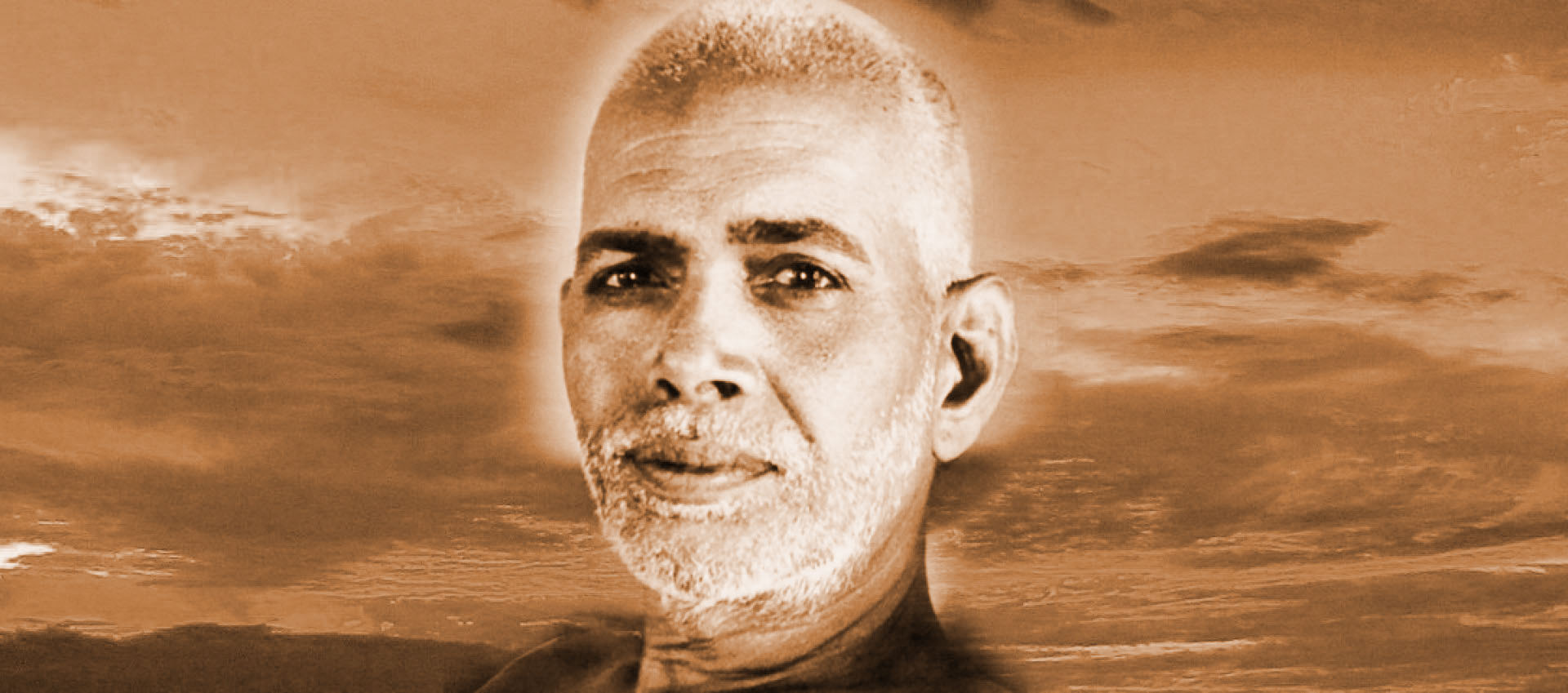
Upadesa Saram (Essence of Teachings)
Wonderful Teachings of Sri Ramana Maharshi
Sanskrit Verses and English Translation
The Genesis of Upadesa Saaram
There is an old legend that a group of Rishis once lived in the forest together, practising Vedic rituals by which they acquired supernatural powers. By the same means they hoped to attain final Liberation. However, in this they were mistaken, for action can only result in action; rituals can produce powers, but not the Peace of Liberation which is beyond rituals and powers and all forms of action. The Rishis then realised that they were up against one more powerful than themselves and they bowed down to him for instruction. He then explained to them that it is not by action but by renunciation of action that one is Liberated.
The poet Muruganar was writing this legend in Tamil verse, but when he came to the instruction given to the Rishis by Shiva he asked Bhagavan, who was Shiva Incarnate, to write it for him. Bhagavan accordingly wrote the instruction in thirty Tamil verses (the 30th verse was composed by Muruganar). Ramana himself later translated these into Sanskrit, and the Sanskrit version was daily chanted before Him together with the Vedas, and continues to be chanted before His shrine; that is to say that it is treated as a Scripture. He refers to the various paths to Liberation, grading them in order of efficiency and excellence, and showing that the best is Self-Enquiry.
Upadesa Saaram – Ramana
उपदेश सारम – रमणा
1
कर्तुराज्ञया प्राप्यते फलं |
कर्म किं परं कर्म तज्जडम ||
kartur ājñyayā prāpyate phalaṃ
karma kiṃ paraṃ karma tajjaḍam
Karma must ever yield its proper fruit,
For thus it is ordained by God, Himself,
Supreme Creator. Then is Karma God?
No, for it is itself insentient.
2
कृति महोदधौ पतनकाराणम |
फलमशाश्वतं गतिनिरोधकम ||
kṛti-maho-dadhau patana-kāraṇam
phalama-śaśvataṃ gati-nirodhakam
Of Karma the results must pass away,
Yet it leaves seeds which in their turn will sprout
And throw the actor back into the flood
Of Karma’s ocean. Karma cannot save.
3
ईश्वरार्पितं नेच्छया कृतम |
चित्तशोधकम मुक्तिसाधकम ||
īśvarārpitaṃ necchayā kṛtam
citta-śodhakaṃ mukti-sādhakam
But acts performed without attachment’s urge
And solely for the service of the Lord
Will cleanse the mind and indicate the way
Which leads at length unto the final goal.
4
कायवाङमनः कार्यमुत्तमम |
पूजनं जपस्चिंतनम क्रमात् ||
kāya-vāṅ-manaḥ kāryam-uttamam
pūjanaṃ japa-ścintanaṃ kramāt
Worship, reciting of God’s Holy Name,
And meditation, mainly are performed
By body, voice and mind, and they excel
Each other in the order here set down.
5
जगत इशधीयुक्तसेवनम |
अष्टमूर्तिभ्रिददेवापूजनं ||
jagata īśadhī yukta sevanaṃ
aśṭa-mūrti bhṛd deva-pūjanam
If we but recognise this Universe
Of eightfold form as form of God, Himself,
And serve in adoration all the world.
This is of God most excellent worship.
6
उत्तमस्तवादुच्चमंदतः |
चित्तजं जप ध्यानमुत्तमम ||
uttama-stavād-ucca-mandataḥ
cittajaṃ japa dhyānam uttamam
Constant repeating of the Holy Name
Is more than praise, at length the voice will sink
To silent repetition in the Heart,
And in this way is meditation learnt.
7
आज्यधारया स्त्रोतसा समम |
सरलचिन्तनम विरलतः परम ||
ajya-dhāraya srotasā samam
sarala cintanaṃ viralataḥ param
Better than meditation that recurs
In broken fits and starts is that which is
A steady ceaseless flow, like the steady flow
Of falling oil or a perennial stream.
8
भेदभावनात्सोहमित्य्सौ |
भवनाभिदा पावनी मता ||
bheda-bhāvanāt so’hamityasau
bhavana’bhidā pāvanī matā
Worship of God as in no way distinct
From him who worships, or in other words
Thinking that .He is I., is better far
Than any other kind of worshipping.
9
भवशून्यसद्भावा सुस्तितिः |
भावनाबालात भाक्तिरुत्तमा ||
bhāva śūnyasad bhāva susthitiḥ
bhāvanā-balād bhaktir-uttamā
To rest in the Real Being, that transcends
Our every thought, by reason of the strength
Of our devotion to some thing conceived;
This of supreme devotion is the truth.
10
हृस्थले मनः स्वस्थता क्रिया |
भक्तियोगबोधास्चा निस्चितम ||
hṛtsthale manaḥ svasthatā kriyā
bhakti yoga bodhaśca niścitam
To be absorbed again into one’s Source (Heart)
Is Karma, Bhakti, Yoga, Jnana, all
These things in truth. Or put in other words
Good works, Devotion, Union, Knowledge, too.
11
वायुरोधनाल्लीयते मनः |
जलापक्षिवाद्रोधसाधनम ||
vayu-rodhanāl līyate manaḥ
jāla-pakṣivat rodha-sādhanam
Just as by the fowler birds are caught in nets
So by the holding of the breath within
The mind can be restrained. This a device
That will effect absorption of the mind.
12
चित्तावायवाश्चित्क्रियायुताहः |
शाखयोर्द्वई शक्तिमूलाका ||
citta-vāyavaś cit-kriyāyutāḥ
śā khayor-dvayi śakti-mūlakā
For mind and life expressed in thought and act,
That is with thought and action as their function,
Diverge and branch like two branches of a tree,
But both of them spring from one single stem.
13
लयविनाशने उभायरोदाने |
लयगतम पुनर्भवती नो मृतम ||
laya vinaśane ubhaya-rodhane
laya-gataṃ punar bhavati no mṛtam
Suppression of the mind comes in two ways,
Absorption and extinction; mind absorbed
Will live again, but mind which is destroyed
Will never revive any more, for it is dead.
14
प्रानबन्धनाल्लीनमानासम |
एकचिंतनान्नशमेत्यदहः ||
prāṇa-bandhanāt līna-mānasam
eka-cintanāt nāśametyadaḥ
When the mind has been controlled,
By the means of restraint of the breath, then make it flow
Along a single current; that achieved
Its form will then entirely disappear.
15
नष्टमानसोत्क्रुष्टयोगिनः |
क्रित्यमस्ति किं स्वस्थितिम ||
naṣta-manasot-kṛṣṭa yoginaḥ
kṛtyam asti kiṃ svasthitiṃ yataḥ
For the Great Sage for whom all form of mind
Has disappeared and who is ever one
With the Reality, there is no Karma more,
For He, indeed, has become the True Self.
16
दृश्यवारितमं चित्तमात्मनः |
चित्वदर्शनम तत्वदर्शनम ||
dṛśya-vāritaṃ citta-mātmanaḥ
citva-darśanaṃ tattva darśanam
When mind has given up the sense-objects
Which are external and has drawn within,
And has perceived its own refulgent form,
Then alone there is True Knowledge.
17
मानसं तु किं मार्गणे कृते |
नैव मानसं मार्गे आर्जवात ||
mānasaṃ tu kiṃ mārgaṇe kṛte
naiva mānasaṃ mārge ārjavāt
When pondering with constant vigilance
Upon the actual nature of the mind
One finds that there is no such thing as mind;
This, in truth, is the straight path for all.
18
व्रत्तयस्त्वहं – वृत्तिमाश्रीताः |
वृत्तयो मनो विद्याहम मनः ||
vṛttayastvahaṃ vṛtti-maśritaḥ
vṛttayo mano viddhayahaṃ manaḥ
The mind is nothing but a lot of thoughts,
Of all these many thoughts it is the thought ’I’
That is the root. So we can see by that
The mind in truth is only the thought ’I’.
19
अहमयं कृतो भवति चिन्वतः |
अयि पतात्यहं निजविचारनम ||
ahamayaṃ kuto bhavati cinvataḥ
ayi patatyahaṃ nijavicāraṇam
From where, therefore, does this ’I-thought’ have its birth?
With vigilant and ever active mind
Seek this, and crestfallen the ’I’ becomes.
The search, itself, is the quest of Wisdom.
20
अहमि नाशभाज्यहमहंतया |
स्फुरति ह्रास्त्वयम परमपूर्णसत ||
ahami nāśa-bhā-jyahama-hantaya
sphurati hṛt-svayaṃ parama-pūrṇa-sat
This search pursued till ’I’ has disappeared
There now vibrates the ’I-I’ all alone,
The quest is finished, there’s no more to seek.
For this is really the Infinite Self.
21
इदमहंपदाभिख्यमन्वहम |
अहमिलीनकेप्यलयसत्तया ||
idamaham padā’bhikhya-manvaham
aham-ilīnake’pyalaya sattayā
This is eternally the true import
Of the term ’I’. For in the deepest sleep
We do not cease to be. We still exist
Even though here there is no sense of ’I’.
22
विग्रहेन्द्रियप्राणधीतामः |
नाहमेकसत्तज्जडम ह्यसत ||
vigrah-endriya prāṇa-dhītamaḥ
nāhameka-sat tajjaḍam hyasat
As I am pure Existence, I am not
The body nor the senses, mind nor life,
Nor even ignorance, for all these things
Are quite insentient and so unreal.
23
सत्वभासिका चित्कवावेतरा |
सत्तयाहिचिच्चिताया ह्याहम ||
sattva-bhāsika citkva vetarā
sattyā hi cit cittayā hyaham
As there is no second consciousness
To know Existence, it must follow that
Existence is itself that consciousness;
So I myself am that same consciousness.
24
ईशाजीवयोर्वेशाधीभिदा |
सत्स्वभावतो वस्तु केवलं ||
īśa-jīvayor veṣa-dhī-bhidā
sat-svabhāvato vastu kevalam
In their real nature as Existence both
Creatures and the Creator are the same,
The Unique Principle. In attributes
And knowledge only, is a difference found.
25
वेषहानतः स्वात्मदर्शनम |
ईशदर्शनम स्वात्मरूपतः ||
veṣa-hānataḥ svātma-darśanam
īśa-darśanaṃ svātma-rūpataḥ
Realization of the Self alone,
Eliminating all its attributes;
Is God-Realization of a truth,
As it is He that shines forth as the Self.
26
आत्मसंस्थितिः स्वात्मदर्शनम |
आत्मनिर्द्वयादात्मनिष्ठता ||
ātma-saṃsthitiḥ svātma-darśanam
ātma-nirdvayād ātma-niṣṭhatā
To be the Self that is to know the Self,
As there is no duality in Self.
This is Thanmaya-Nistha, or the state
Of absolutely being That in truth.
27
ज्ञानवर्जिताज्ञानहीनचित |
ज्ञानमस्ति किं ज्ञातुमंतरम ||
jñāna-varjitā-jñana-hina cit
jñānam-asti kiṃ jñātum-antaram
That knowledge is true knowledge which transcends
Knowledge and ignorance both equally.
And this alone is truth. For there is no
Subject or object there that can be known.
28
किं स्वरूपमित्यात्मदर्शने |
अव्ययाभावापूर्नाचित्सुखम ||
kiṃ svarūpamit-yātma darśane
avyayābhavā” pūrṇa-cit sukham
If one can only realize at Heart
What one’s true nature is, one then will find
That it is Infinite Wisdom, Truth and Bliss,
Without beginning and without an end.
29
बन्धमुक्त्यातीतम परं सुखं |
विन्दतीह जीवस्तु दैविकः ||
bandha muktyatītaṃ paraṃ sukham
vindatīhajī vastu daivikaḥ
Remaining in this state of Supreme Bliss,
Devoid of bondage and of freedom too,
Is found to be a state in which one is
Rapt in perpetual service of the Lord.
30
अहमपेतकं निजविभानकम |
महदिदंतपो रमणवागियम ||
aham-apetakaṃ nija-vibhānakam
mahadidaṃ tapo ramaṇa vāgiyam
By ardent quest and shedding ego’s veil
Realize the Self, the One that’s ego-less,
And function thus; this is the only right penance.
So teaches Bhagavan Sri Ramana,
Who is the SELF of everything that is.
English Translation and Notes by Sri B. V. Narasimhaswami, the author of “Self-Realization”, one of the original, ardent devotees of Bhagavan Sri Ramana Maharshi.


Wonderful book. Good for serious study of advaita.